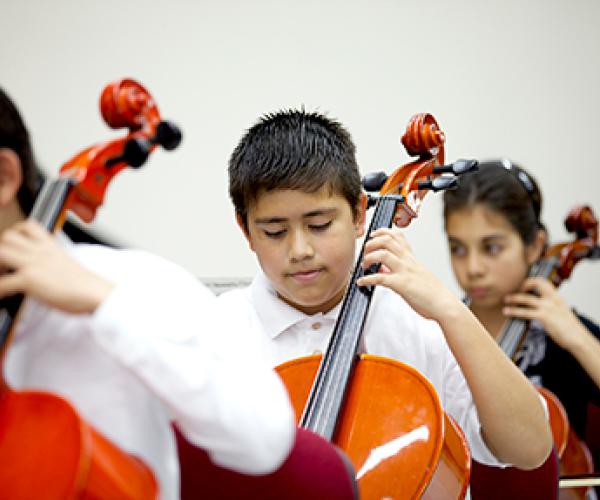Music Research
The NAMM Foundation is a non-profit supported in part by the National Association of Music Merchants and its 10,300 members around the world. The NAMM Foundation works to advance active participation in music making across the lifespan by supporting scientific research, philanthropic giving and public service programs. See more NAMM Foundation research.
The NAMM Foundation is a non-profit supported in part by the National Association of Music Merchants and its 10,300 members around the world. The NAMM Foundation works to advance active participation in music making across the lifespan by supporting scientific research, philanthropic giving and public service programs. See more NAMM Foundation research.
News Secondary

Toddler
Infants recognize the melody of a song long before they understand the words. They often try to mimic sounds and start moving to the music as soon as they are...
Benefits of Music For Toddlers
- Research reveals strong connections between rhythm skills and pre-reading abilities in toddlers.
- Music enhances fine motor skills, or the ability to use small, acute muscle movements to write, use a computer, and perform other physical tasks

Children
Everyday listening skills are stronger in musically trained children than in those without music training. Significantly, listening skills are closely tied to...
Benefits of Music For Children
- Everyday listening skills are stronger in musically-trained children than in those without music training. Significantly, listening skills are closely tied to the ability to: perceive speech in a noisy background, pay attention, and keep sounds in memory.
- Researchers found that after two years, children who not only regularly attended music classes, but also actively participated in the class, showed larger improvements in how the brain processes speech and reading scores than their less-involved peers.
- Music training leads to greater gains in auditory and motor function when begun in young childhood; by adolescence, the plasticity that characterizes childhood has begun to decline. Nevertheless, our results establish that music training impacts the audit
- Research shows that making music changes the brain, and that these brain changes have tangible impacts on listening skills, learning and cognition.
- Individuals who took music lessons as children show stronger neural processing of sound: young adults and even older adults who have not played an instrument for up to 50 years show enhanced neural processing compared to their peers.

Teens
Schools with music programs have an estimated 90.2% graduation rate and 93.9% attendance rate compared to schools without music education, which average 72.9%...
Benefits of Music For Teens
- Adolescent-centered studies show that even very basic rhythm abilities, such as tapping to a beat, relate with reading skills, and we have provided initial evidence for how both abilities may rely on common underlying neural mechanisms of sound processing
- Students who take music in middle school score significantly higher on algebra assignments in 9th grade than their non-music counterparts.

All Ages
Both music and language are complex communication systems, in which basic components are combined into high-order structures in accordance with rules. Whether...
Benefits of Music For All Ages
- Musical experience strengthens many of the same aspects of brain function that are impaired in individuals with language and learning difficulties, such as the neural timing precision which allows differentiation between speech syllables.
- Musical expertise is associated with distinctive enhancements in how the nervous system encodes sound (such as stronger representation of harmonic information and greater resilience to noise) that emerge with musical training, even in early childhood.
- Studies show that even a few years of musical training early in life improve how the brain processes sound, and that the benefits of early exposure to music education last well into adulthood, years after the training has ceased
- Researchers found that those who played an instrument for two years showed a stronger "neurophysiological distinction" between certain sounds than children who didn't get the instrumental training.
- Both music and language are complex communication systems, in which basic components are combined into high-order structures in accordance with rules
- Cross-sectional comparisons of musicians to non-musicians have established a variety of musician enhancements in auditory skills and their neural substrates, extending from enhanced perception and neural encoding of speech
- Musical training is thought to improve nervous system function by focusing attention on meaningful acoustic cues, and these improvements in auditory processing cascade to language and cognitive skills.